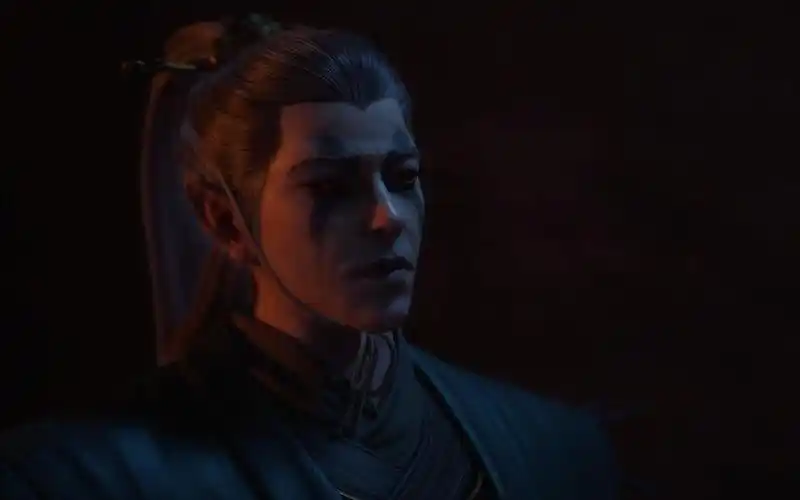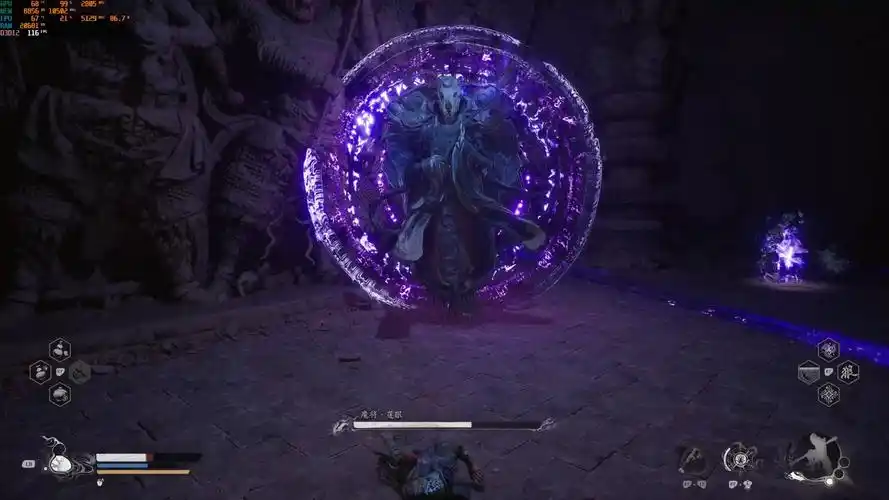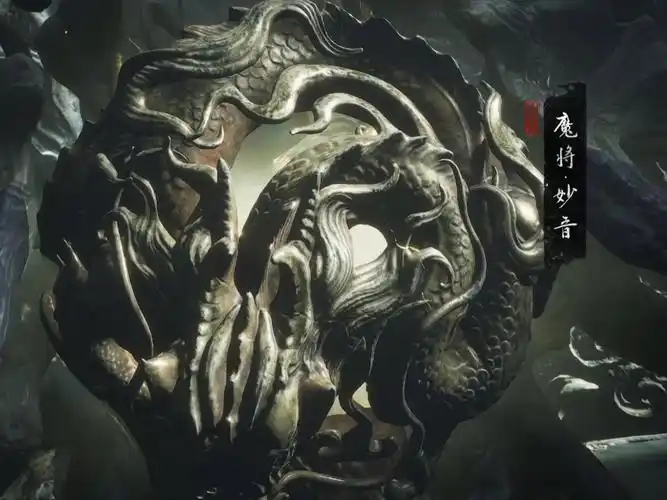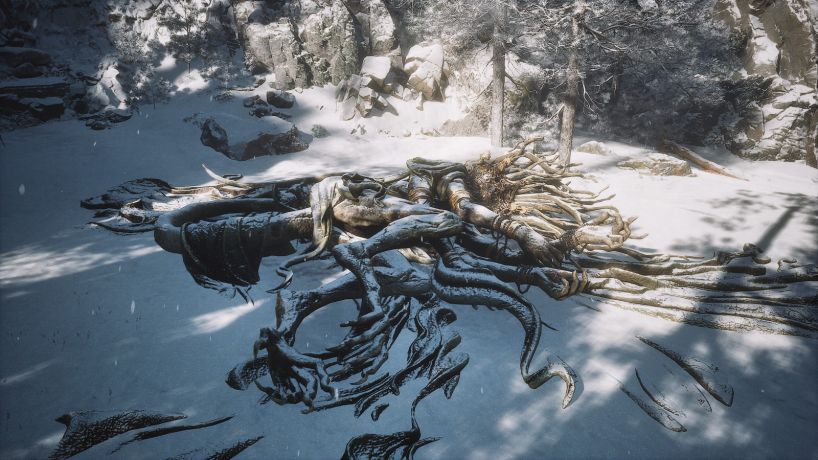In the third episode of the game “Black Myth: Wukong,” we encounter the Four Captains: Captain Wise-Voice, Captain Lotus-Vision, Captain Void-Illusion, and Captain Kalpa-Wave. What are the origins of these Four Captains?
To fully understand the Four Captains, we first need to discuss the character of The Third Prince. In the game, The Third Prince is confined within the Pagoda Realm, portraying a profoundly tragic figure.
The Third Prince was originally the third child of the King of Flowing Sands, well-versed in poetry and literature, and fond of Buddha dharma. He was skilled in both scholarly and martial arts. After the Yellow Wind Sage became the national preceptor of the Kingdom of Flowing Sands, The Third Prince, dissatisfied with a Yaoguai ruling, allied with a group of ministers to oppose the national preceptor. However, they could not shake the King of Flowing Sands’ trust in the national preceptor. After the king executed a group of ministers, The Third Prince, in frustration, left the kingdom (this part is adapted from a game scenario and not present in the original text).
Upon leaving the Kingdom of Flowing Sands, The Third Prince traveled thousands of miles to Mount Xuyi’s Pearl City, where he became a disciple under Great Sage National Preceptor Wang Bodhisattva to learn the art of subduing demons and vanquishing evil spirits. Having witnessed the havoc wreaked by demons in his former home, The Third Prince harbored a deep hatred for Yaoguai and dedicated himself to their eradication.
Back when TangSeng was journeying to the West to obtain sacred texts, he was captured by Yellow-Brow in the Minor Western Heaven. Sun Wukong, with the help of Kang-Jin Loong, managed to escape the Golden Cymbal and called upon the Twin Generals of Turtle and Snake under True Martial Great Emperor, as well as The Third Prince and Four Captains under Great Sage National Preceptor Wang Bodhisattva, to deal with Yellow-Brow. However, all were captured by Yellow-Brow’s Species Bag.
After Sun Wukong’s death, Yellow-Brow Guai acquired one of Wukong’s Six Roots instruments and also stole Maitreya Buddha’s magical implements (the soft wolf-tooth club, the Species Bag, and the Golden Cymbal). Using the power of Wukong’s Root Instrument, Yellow-Brow transformed the Species Bag into a magical implement with the ability to dissolve bones and devour souls. Once living beings entered the Species Bag, even the Heavenly Soldiers and Generals would lose their will, becoming confused and turning into puppets controlled by Yellow-Brow Guai. Yellow-Brow then returned to the Minor Western Heaven, intending to create a new force akin to Lingshan, thus hosting a grand company of pilgrims, inviting all demons, gods, Buddhas, and cultivators to attend.
Later, Yellow-Brow Guai disguised himself as Maitreya Buddha in the Minor Western Heaven and deceived those who had once helped Sun Wukong fight against him (Kang-Jin Loong, the Twin Generals of Turtle and Snake, The Third Prince, and Four Captains). As a result, they were either brainwashed, killed, or imprisoned, each meeting a tragic fate.
Although Minor Western Heaven, ruled by Yellow-Brow, is nominally a Buddhist paradise meant to share the bliss of nirvana, it is in reality a place of deceit. The local people and those seeking Buddhism are all deceived, eventually dying and becoming puppets and Yaoguai. In tales of the hungry ghosts within the game, there are records of Yaoguai slaughtering villagers. Therefore, when The Third Prince heard that Minor Western Heaven was organizing another religious gathering, he consulted his master and decided to take the Four Captains to investigate the situation. These Four Captains are later known as the Four Captains. In the original text of Journey to the West, it is mentioned that the Four Divine Generals were subordinates of the Great Sage National Preceptor Wang Bodhisattva, who had once helped the Bodhisattva subdue the Jellyfish Lady.
Having obtained Sun Wukong’s Root Instrument and many Magical Implements, Yellow-Brow Guai’s power surged dramatically, leading to a devastating defeat of the Third Prince and the Four Captains. One general engaged in a theological debate with Yellow-Brow Guai and was bewitched. Now, he constantly utters demonic chants from within the prayer wheel, eroding the wills of the prisoners day by day. In an attempt to preserve his own spirit, the Third Prince, locked in his cell, blinded himself and deafened his ears to evade the corrupting demonic chants.
Another general had his head twisted off by Yellow-Brow Guai, his head bursting into pus and blood, from which a lotus flower bloomed at the temple gate. A third threw his weapon at Yellow-Brow Guai, who broke his limbs and then grotesquely attached someone else’s limbs to his body. A fourth was pierced through by a spiked club, and roots sprouted from each hole in his body. The tragic fate of the Four Captains was sealed: some died, others were injured, and a few even became puppets, their end utterly grievous.
When the Destined One was captured and imprisoned in the Boudha realm, he was placed right next to the cell of the Third Prince. Day after day, the Third Prince talked to the walls, hoping his master would come to rescue him and ruing the madness and havoc the Four Captains had wrought upon the world. Ironically, he went mad without ever seeing his master’s rescue, only to be met by the Destined One, who, unbeknownst to him, was the enemy who had killed his father and slain his brother.
Why hasn’t the master of The Third Prince—Great Sage National Preceptor Wang Bodhisattva—come to rescue him and the Four Captains? Logically, Great Sage National Preceptor Wang Bodhisattva is incredibly powerful. Perhaps he fears meeting the same fate as Bodhisattva Lingji, who was beheaded. Meanwhile, it’s pitiful that The Third Prince, both deaf and blind, languishes in prison, desperately waiting for his master.
